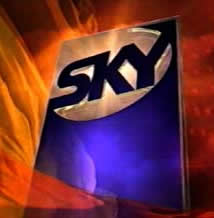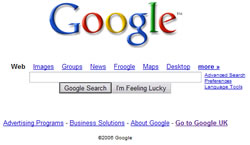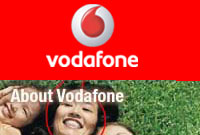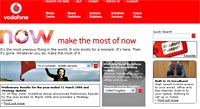 This morning, Homechoice, the currently London-focused DSL-based VOD announced that they had appointed CSFB (Credit Suisse First Boston, as was) to raise new capital for their expansion around the UK.
This morning, Homechoice, the currently London-focused DSL-based VOD announced that they had appointed CSFB (Credit Suisse First Boston, as was) to raise new capital for their expansion around the UK.
Starting 2006, Homechoice plan to expand the number of homes they cover from the current 2.4m homes to over 10m. Homechoice state that this footprint is approaching the same size as that of the combined UK cable companies, which they’re close with, as ntl + Telewest actually have just over 12.6m.
New subscriber figures have also been announced by Homechoice, revealing 34,000, more than double the 15,000 previously disclosed and widely quoted this week when rurmours of Sky being interested buying them were circulating.
Roger Lynch pointed out, “We’re now the fastest growing pay TV service relative to our footprint ,” which, while it’s encouraging, would be expected given they started at such a small number of subscribers.
 Their newly-announced ARPU (Average Revenue Per User) figures are impressive at £430, being considerably higher than Sky’s £384 (announced in 3 August 2005), but lower than Telewest’s £538 and ntl’s £477 (reported to ofcom, Q2 2005).
Their newly-announced ARPU (Average Revenue Per User) figures are impressive at £430, being considerably higher than Sky’s £384 (announced in 3 August 2005), but lower than Telewest’s £538 and ntl’s £477 (reported to ofcom, Q2 2005).
Comment
We find it slightly confusing that Homechoice is headlining this news release with their national expansion, which has been a long-stated aim for them and is therefore not news, and not CSFB’s appointment. They’re also putting out a whole lot of figures saying how well they’re doing. We’re not clear if this down to them wanting to make the most of the resent press interested the Sky rurmours have brought or a way of trying to cover that they’re need more money, or just genuine excitement of working the CSFB.
On the financing of the next stage of the roll-out, Lynch explained, “We’ve also reached the stage in our corporate development when we believe it’s right to raise capital from new investors. Hence our decision to appoint CSFB.
This could be read as saying that the current majority backer, Digital Explosion, which is owned by Chris Larsons, a Microsoft co-founder, doesn’t look like it’s prepared to fund the next stage. When we asked Homechoice, their spokesperson said Digital Explosion “Remained committed,” one further probing they wouldn’t be drawn on how much more money, if any they were prepared to invest.
We really hope that Homechoice is successful, we’ve always have been, and continue to be supporters of theirs – for their vision, their progress and their sheer bloody-minded determination to keep going.
Homechoice
 iSupply did one of their usual Teardown’s on the Apple iPhone, estimating that they are on a 55% margin for each 8Gb phone that they sell.
iSupply did one of their usual Teardown’s on the Apple iPhone, estimating that they are on a 55% margin for each 8Gb phone that they sell. Nintendo’s stock market valuation was briefly higher than Sony’s on the Osaka Stock Exchange this morning.
Nintendo’s stock market valuation was briefly higher than Sony’s on the Osaka Stock Exchange this morning. Research house iSupply are predicting that IPTV will be boosting the reveneue generated by the premium video services market from its current level of less than $200Bn to a whopping $277Bn by 2010.
Research house iSupply are predicting that IPTV will be boosting the reveneue generated by the premium video services market from its current level of less than $200Bn to a whopping $277Bn by 2010. That aside, iSupply see the battle royal between two big, hairy beasts – the current pay-TV world of direct-to-home satellite and digital and analogue cable TV services – and the telcos who will be pushing quad-play.
That aside, iSupply see the battle royal between two big, hairy beasts – the current pay-TV world of direct-to-home satellite and digital and analogue cable TV services – and the telcos who will be pushing quad-play. Apple has continued to increase the number of iPods they’re selling. Their latest quarterly results show that they grown the 8.11m iPods they sold in the previous quarter to 8.73m this quarter, beyond market expectations. The quarter that is reporting didn’t change or introduce any new iPods.
Apple has continued to increase the number of iPods they’re selling. Their latest quarterly results show that they grown the 8.11m iPods they sold in the previous quarter to 8.73m this quarter, beyond market expectations. The quarter that is reporting didn’t change or introduce any new iPods.  BSkyB results for the last year were broadly in line with predictions, but seasoned watchers of all things financial, recognise tell-tale signs of a flattening of the growth curve. The company has managed its spend on programming well, but technology costs remain high, with significant outgoings on expensive High Definition equipment, that won’t bring instant revenue returns.
BSkyB results for the last year were broadly in line with predictions, but seasoned watchers of all things financial, recognise tell-tale signs of a flattening of the growth curve. The company has managed its spend on programming well, but technology costs remain high, with significant outgoings on expensive High Definition equipment, that won’t bring instant revenue returns.  James Murdoch the CEO of BSkyB told the corporate world that “Our industry is changing faster than ever before and for Sky, 2006 has been an important and exciting year.”
James Murdoch the CEO of BSkyB told the corporate world that “Our industry is changing faster than ever before and for Sky, 2006 has been an important and exciting year.”  There’s been tons of financial results coming out around now, but we’ve spared you from them – we’re nice like that. Today we felt it was worth an exception.
There’s been tons of financial results coming out around now, but we’ve spared you from them – we’re nice like that. Today we felt it was worth an exception.  As is well known, one way Google does so well is by getting other sites (partners) to carry their clients advertising for them (of which Digital-lifestyles is one). In accounting-ese/jargon, they refer to it as Traffic Acquisition Costs or TAC. These increased to $785 million, up from $723 million in its first quarter. The TAC (see how quickly you can get into the swing of this jargon) remains at 32% of their advertising revenue, giving a rough understanding that Google take 68% of these ad earnings – pretty healthy in their favour.
As is well known, one way Google does so well is by getting other sites (partners) to carry their clients advertising for them (of which Digital-lifestyles is one). In accounting-ese/jargon, they refer to it as Traffic Acquisition Costs or TAC. These increased to $785 million, up from $723 million in its first quarter. The TAC (see how quickly you can get into the swing of this jargon) remains at 32% of their advertising revenue, giving a rough understanding that Google take 68% of these ad earnings – pretty healthy in their favour.  In the normal world, if you’d just discovered that your business had lost £14.9bn ($27.9bn) in a single year, you’d be blubbering into your laptop or heading to the pub to down a vat of Old Scrote’s Badger ale.
In the normal world, if you’d just discovered that your business had lost £14.9bn ($27.9bn) in a single year, you’d be blubbering into your laptop or heading to the pub to down a vat of Old Scrote’s Badger ale.  In the white-hot mobile phone segment, Vodafone continues to create growth in key markets such as Germany, Spain and the United States, despite being forced to scuttle out of Japan – selling the business for £8.9bn – after failing to make much of a mark in the country.
In the white-hot mobile phone segment, Vodafone continues to create growth in key markets such as Germany, Spain and the United States, despite being forced to scuttle out of Japan – selling the business for £8.9bn – after failing to make much of a mark in the country.  ?The tumbrels are resounding for enemies of Google European head, and former T-Mobile boss, Nikesh Arora, following the “disappointing” financial results. In fact, the results were trivially down, but that was enough, and his head will be anxiously sought by Google in the US, say our stray packet interception team.
?The tumbrels are resounding for enemies of Google European head, and former T-Mobile boss, Nikesh Arora, following the “disappointing” financial results. In fact, the results were trivially down, but that was enough, and his head will be anxiously sought by Google in the US, say our stray packet interception team. And the City doesn’t like people it can’t cut down to size. Give them an excuse, and they will jump on you, which is what happened. That $40m is the excuse they’ve been waiting for. “Misled us with the forecast!”
And the City doesn’t like people it can’t cut down to size. Give them an excuse, and they will jump on you, which is what happened. That $40m is the excuse they’ve been waiting for. “Misled us with the forecast!” This morning, Homechoice, the currently London-focused DSL-based VOD announced that they had appointed CSFB (Credit Suisse First Boston, as was) to raise new capital for their expansion around the UK.
This morning, Homechoice, the currently London-focused DSL-based VOD announced that they had appointed CSFB (Credit Suisse First Boston, as was) to raise new capital for their expansion around the UK. Their newly-announced ARPU (Average Revenue Per User) figures are impressive at £430, being considerably higher than Sky’s £384 (announced in 3 August 2005), but lower than Telewest’s £538 and ntl’s £477 (reported to ofcom, Q2 2005).
Their newly-announced ARPU (Average Revenue Per User) figures are impressive at £430, being considerably higher than Sky’s £384 (announced in 3 August 2005), but lower than Telewest’s £538 and ntl’s £477 (reported to ofcom, Q2 2005). The big news late yesterday was that Google announced a second round share offer – on the first anniversary of their IPO.
The big news late yesterday was that Google announced a second round share offer – on the first anniversary of their IPO.  Mary Meeker from Morgan Stanley clearly feels the same, “this cash balance could allow the company increased flexibility to consider large strategic acquisitions.”
Mary Meeker from Morgan Stanley clearly feels the same, “this cash balance could allow the company increased flexibility to consider large strategic acquisitions.”